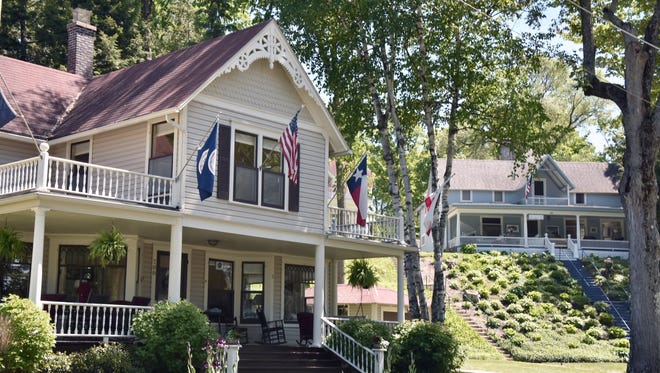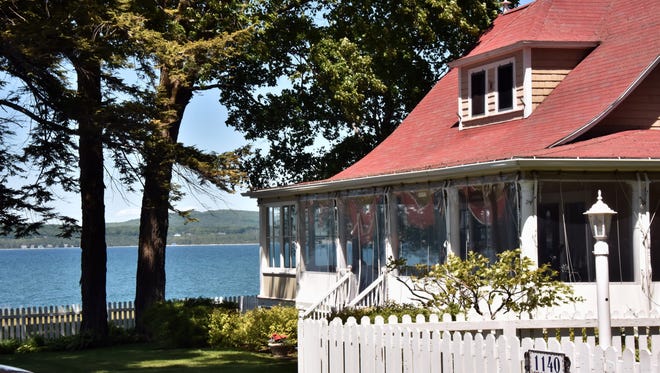Bay View resort's ban on non-Christians faces legal challenge
 Francis X. Donnelly
Francis X. Donnelly
Bay View — This summer resort has fostered spiritual and intellectual growth for 143 years. Perched on Little Traverse Bay, the woodsy community offers seminars, sermons and the performing arts.
Amid the beauty and high ideals of Bay View, however, lies a dark secret. Jews and other non-Christians can’t buy a home in the community, which is just northeast of Petoskey. According to one of its bylaws, homeowners must be “of Christian persuasion.”
Some residents have filed a federal lawsuit to overturn the rule. A hearing is scheduled July 30 in U.S. District Court in Kalamazoo.
Don Duquette, one of the plaintiffs, said he can’t believe this issue is still being fought in the 21st century. The ban is illegal, un-American and un-Christian, he said.

“We need to do something,” Duquette said. “We’re fighting for the soul of this place.”
Supporters of the ban said non-Christians would provide less financial and volunteer support to the group because they wouldn’t be as invested in its Christian values and traditions.
“It doesn’t make sense to have members who don’t embrace the mission voting on issues that will determine the future of our Christian organization,” said Dick Crossland, whose family has been coming here for nearly a century.
The festering issue has strained relations in the once tight-knit town of about 900 people, residents said. It has ended decades-long friendships and even turned family members against one another.
A 2013 vote split the community, with 52 percent of the 702 voters wanting to allow non-Christians. But changes to the bylaws require a two-thirds vote of approval.
To own a home in Bay View, one must be a member of the Bay View Association, which owns the land, while residents own the cottages.
Crossland wants the community to remain the way it is, but others said change is coming, one way or another.
If the non-Christian ban remains, residents will move away and Bay View will change from a positive anachronism into a negative one, critics said.
“The only people who will buy cottages will be people who support discrimination," said Anne Pollin, who had long visited Bay View as a Methodist before converting to Judaism.
'An old-fashioned place'
A trip to Bay View is like stepping back in time.
Its 447 Victorian cottages were built in the late 1800s. The pastel gingerbread homes boast sweeping verandas and stately turrets.
The scent of pine and spruce along the narrow tree-lined streets seems just as strong as one imagines in centuries past, the gladiolas just as plentiful.
“It’s an old-fashioned, back-in-time place,” said Amy Pines, 56, who has been coming to Bay View her whole life.

This Brigadoon-on-the-bay was founded by Methodists in 1875 as a place for camp meetings, a euphoric gathering where church members would pray, sing hymns and listen to traveling preachers.
The purpose of the summer gatherings expanded a decade later, adding intellectual and cultural growth. A 1900 brochure celebrating the 25th anniversary said residents could be “any or no denomination.”
The Victorian ideal of self-improvement remains vibrant today.
Residents listen to lectures on politics, philosophy, topical events. They attend recitals, theater, ballet. They go to classes in gardening, water coloring, bread baking, salsa dancing.
“It’s the best thing going,” said Marjorie Bayes, 83, who has been coming for eight decades. “You go to lectures, music, classes and then go to the beach.”
Non-Christians weren’t always prohibited in this cultural haven.
The door closed in 1947 when the resort adopted a bylaw that prohibited non-Christians and blacks.
It was a time of growing anti-Semitism in the United States as many citizens opposed the immigration of Jewish refugees from Nazi Germany, historians said.
The race ban was eliminated in 1959.
In the 1960s, Bay View implemented a quota where no more than 10 percent of residents could be Catholic. That, too, was eliminated in the 1980s.
Rule shifts except on religion
In the following decades, residents knew about the non-Christian rule but found it quirky, a relic from an earlier era. They never imagined it would be enforced.
But when they married Jewish people or had children who converted to Judaism, their Jewish relatives were rejected for membership in the association. Also affected were members’ children who don’t belong to any church.
A group of members tried to convince the association’s Board of Trustees to change the bylaw in 2010. They circulated a petition with 289 signatures and embarked on a letter-writing campaign that included emotional accounts from some of the rejected people.
“Some kind of ‘religious litmus test’ goes against everything Bay View stands for,” John and Mary Agria wrote to the board in 2010.
The board declined to act and, since then, the issue has been raised year after year.
During an election in 2011, 48 percent of the 727 voters supported dropping the non-Christian ban.
In 2012, a 12-person committee on membership met through the summer to hash out a compromise but ultimately couldn’t.
In 2013, the second election also failed to get the two-thirds majority needed to change the rule.
Before the 2013 election, the proposed change was supported in a statement signed by 16 of the 18 clergymen who lived in Bay View. Among them were all of the Methodist ministers, including the late Emerson Colaw, bishop of the Midwest district of the United Methodist Church.
“We love this community,” said Duquette, 71, a retired University of Michigan law professor from Ann Arbor. “If it wasn’t so special, we wouldn’t spend this much time and energy to correct the rule.”

Pines wrote a letter to the trustees in 2010 asking them to reconsider the ban. A Methodist whose family has lived in Bay View since 1950, she married a Jewish man and they raised their children Jewish.
Pines told The Detroit News she thought the rule was so archaic that, once she and other letter writers objected to it, the board would quickly eliminate it.
Eight years later, the matter is no closer to being resolved. Being rejected by such a beloved place is like being slapped by a grandparent, Pines said.
“My question is: Where do these people live during the winter?” she said. “I don’t live anywhere where I can control who’s around me. I don’t want to control who’s around me.”
Failed rewrite prompts lawsuit
After failing to convince the trustees or community to overturn the ban, some residents filed the federal lawsuit in 2017.
The court case may turn on the definition of Bay View, legal experts said. Is it a town or a homeowners’ group?
Bay View Association of the United Methodist Church was organized under an 1889 state law that imbued it with government powers, such as maintaining streets, water, zoning and the building code.
Those powers make Bay View a quasi-governmental entity, according to the lawsuit. As such, it is bound by the same federal laws that prohibit other public entities from religious discrimination.
Nonsense, Bay View countered. The association said it’s a private religious group that is exempted from the federal law by the Constitution's protection of freedom of worship.

“Bay View Association was formed by ministers seeking to foster a culture rooted in the cause of religion and morality,” association President Jon Chism said in a statement.
Supporters of the Christian requirement said it’s part of the enclave’s identity.
Distinctiveness, what makes it special. It’s the foundation the place is built upon.
Without it, Bay View would be like every other resort, they said.
“It’s always been some place apart,” said Crossland, 74, a retired consultant from Englewood, Fla. “Bay View is a unique, special place.”
Critics of the ban were buoyed by a recent ruling by the federal Department of Housing and Urban Development.
Responding to a complaint by the critics, HUD ruled in May that Bay View failed to prove it’s exempt from the federal Fair Housing Act, which prohibits discrimination. The ruling is separate from the federal lawsuit.
The United Methodist Church distanced itself from the controversy.
David Bard, bishop of the church in Michigan, said in a statement the church doesn’t provide oversight or appoint members to the association. Bard is an ex-officio member of the association board but said he hasn’t done anything in the role.
“The Bay View Association, separate from the United Methodist Church, has its own rules and requirements about who can be a member,” he said.
'Wrong side of history'
For Pollin, 59, a middle school teacher from Bel Air, Maryland, the issue runs deeper than whether Bay View is violating the fair housing law. It’s a question of morality, she said.
Her family has owned a cottage here since the 1890s. She is the fourth generation to visit there. Her children will not be the fifth.
She wanted to co-own her parents’ cabin in 2004 but was rejected because she had converted to Judaism.
The decision smacked of prejudice and racism, she said. For it to happen in a place that promotes love and community made it more appalling.
“It’s basically systematic bigotry,” Pollin said. “They’re on the wrong side of history.”
Longtime residents talk about their memories of the resort: going to the boys’ and girls’ club, sitting with friends at the beach, learning to sail together, singing besides one another in musicals, serving as ushers in church.

Their children became friends, as did their children’s children.
It could take an hour to walk down the block because they ran into so many friends they hadn’t seen since the prior year.
For some families, those memories lie spoiled in the summer sun.
Their beloved haven is driving them apart with relatives on different sides of the membership issue.
Jeremy Sheaffer, whose family has lived in Bay View since 1917, is the fifth generation to own a home there. But he can’t bequeath it to his wife or children, who are Jewish.
Sheaffer, 51, an environmental lobbyist from Hallowell, Maine, opposes the rule while his cousin, Peggy Child Smith, who sits on the trustee board, supports it.
“A friend asked, ‘Why stay a part of it?’” Sheaffer said. “Because it’s my hometown. You don’t abandon your hometown. You try to fix it.”
Smith declined to discuss the issue.
As the family celebrated its centennial of living in Bay View last year, Sheaffer’s late mother, Anne Child Sheaffer, 87, wrote a letter to the local newspaper.
“If my grandchildren can be denied membership based on their religion, isn’t something wrong?” she said.

fdonnelly@detroitnews.com